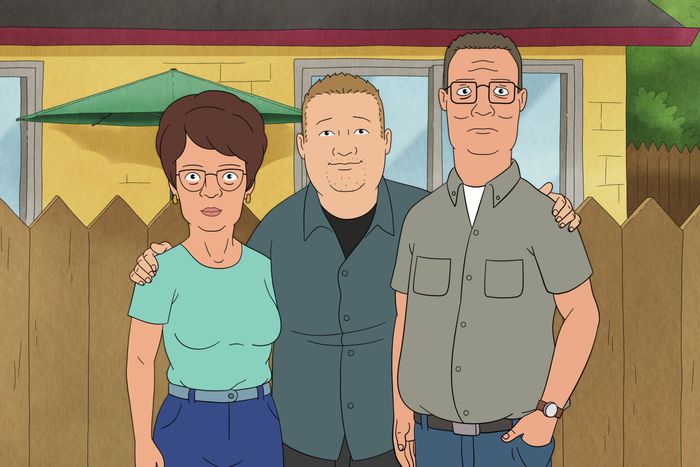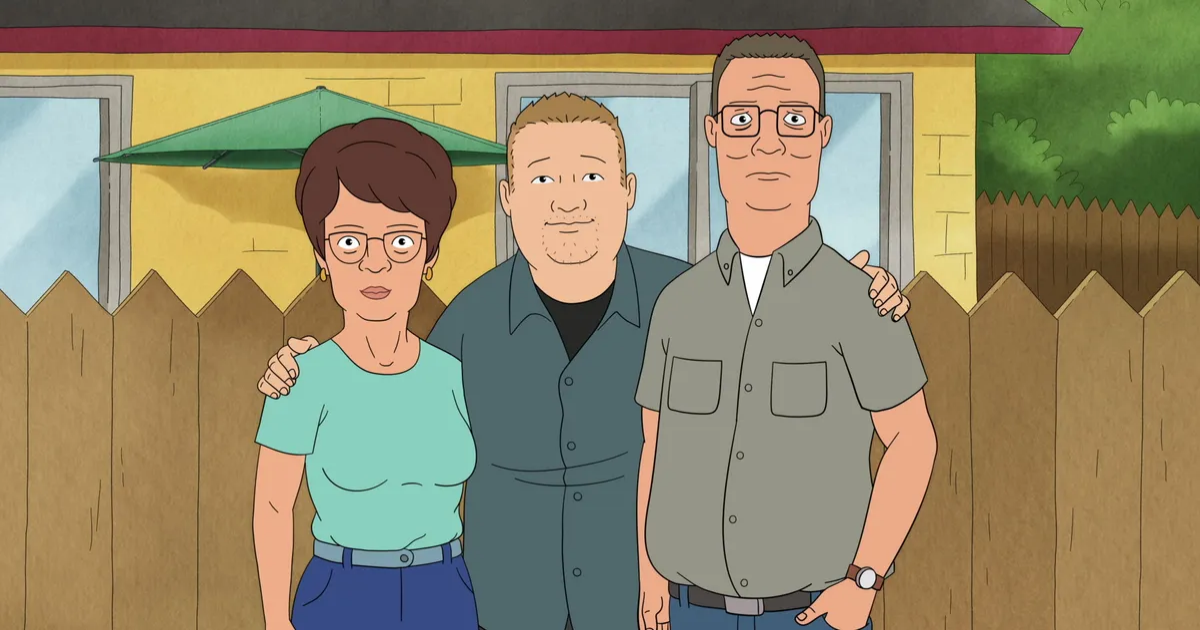
That boy ain’t a boy anymore, I tell you what. Photo: Hulu
Hank and Peggy Hill are back in Arlen, Texas, and not just because Hulu is reviving King of the Hill. Turns out they’ve been away from the Lone Star State for a long time, because Hank took his propane-and-propane-accessory talents overseas to a new job in Saudi Arabia. The upcoming season, which premieres all ten episodes on August 4, takes place in the present day as Hank and Peggy return to a somewhat different America.
“We liked the idea that he had been gone for a while, and the most Mayberry kind of freezer that you could put the family in was an Aramco base, which is like an idealized kind of white-picket-fence America,” says show co-creator Greg Daniels. “They had gone to Saudi Arabia and they were just coming back and had missed out on a lot of recent, uh, cultural changes.”
Since King of the Hill aired what was then its series finale toward the end of the first year of the Obama presidency, we’ve had tech bros, apps, cancel culture, the proliferation of boba and poke restaurants, a Trump presidency, a pandemic, and another Trump presidency, to name just a few. It’s a lot to grapple with, and as revealed in the new, updated intro for the returning show, Dale, Bill, and Boomhauer — those Alamo beer-drinking alley loiterers — had to grapple with it sans Hank.
“A lot has happened in the world since the original run of the show ended. There’s just a lot more for Hank to complain about,” says Mike Judge, King of the Hill’s other co-creator. In present-day Arlen, Hank is thrown for a loop by electric scooters, drones, and ride-share etiquette, but while he’s baffled by some of these developments and a curmudgeon about others, he’s somehow still more rational than most of his neighbors.
Like, for instance, conspiracy nut Dale Gribble, who used to represent “the extreme of extremists” on the old show. Now he might as well be a median voter. As Saladin K. Patterson, the new showrunner of the revival, puts it, “There’s more extreme in real life than Dale now.”
“Hank always represented the sensible middle, the old show did a great job handling the extremes and kind of pushing people towards what the common-sense middle was,” says Patterson. “Well, Hank’s been gone, and while he’s gone, the country’s changed so much that where Hank stood in the middle isn’t really the middle anymore.”
The original run of King of the Hill drew praise for its smart and even-handed look at this here country we call America, focusing on blue-collar workers, coming of age in purple-state suburbia, and small-c conservatism. (And for being very, very funny.) The idea of putting Hank’s seemingly outdated moderation to the test in the current landscape is something the revival’s creators are running toward, not away from. That said, if you’re hoping to learn, specifically, how Hank voted in the last three elections, don’t. Daniels says the show is and always has been about the cultural divide rather than a political one.
“It always was a very specific show. It’s about these characters who live around this alley. It’s a character comedy,” Daniels explains. “I hope no one has an expectation that it’s a late-night show. Animation takes a long time. We’re not ripping headlines. It’s about character and culture.”
“I think focusing on small, relatable things was the way that we were able to steer clear of things that were gonna feel like gratuitous satire, on-the-nose, or just ineffective. You know, Oh, I see what they’re doing here. That’s a conservative point of view, that’s a liberal point of view. It’s kind of easy and simple, right?” Patterson says.
There have been some other changes in Arlen. Dale’s voice actor, Johnny Hardwick, died during production of the season after completing some recording. Given Dale’s importance as a character, Patterson says they came up with “a solution that we know fans of the show and the character and Johnny are gonna feel was a good choice.” The late Brittany Murphy and Tom Petty’s characters, Luanne and Lucky, were written to have moved away — a reasonable thing for a couple to do. And in a post–The Problem With Apu world, a new actor has been cast to voice Hank’s Laotian American neighbor, Kahn Souphanousinphone, taking over for Toby Huss.
Perhaps the biggest change, though, is the fact that Bobby Hill is all grown up. Now 21 years old, one of TV’s greatest child characters has become a young man and given up his dream of becoming a world-famous prop comic. Bobby’s adult ambitions have kept him in Texas as the chef and co-owner of a Japanese-German Hill Country fusion BBQ joint in Dallas, close enough for him to visit his parents when they move back into the old family home. But not everything about the Hill family scion has changed: He still sounds more or less the same, with Pamela Adlon returning to voice Bobby. (Patterson says they went back and forth on whether or not to deepen the voice performance. The changes are ultimately subtle.)
Seeing Bobby mature is the aspect of the returning series Daniels says he was most excited about, and while Hank is still the focus of most of the storylines, you could make a credible case that the younger Hill is now the heart of the show. “When you think about a protagonist, you could say it’s who has the most stakes,” Daniels says. “Hank’s life is pretty settled, but Bobby’s life is kind of up in the air, and young people are having more challenges today in trying to make the kind of life that their parents have.”
“I was excited to see what the version of ‘That boy ain’t right’ attitude was gonna be with Hank now that Bobby’s grown,” agrees Patterson. “I think we have some fun when they are not on the same page, but Hank has to respect Bobby now as an adult.”
